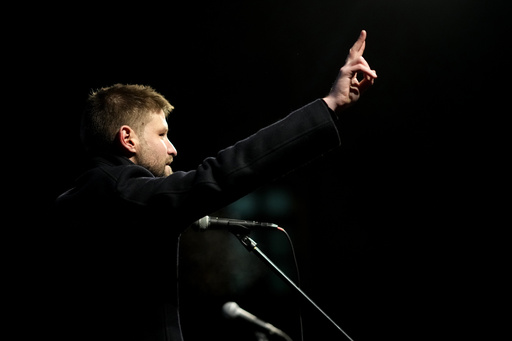
Thousands of demonstrators congregated in the heart of Slovakia’s capital on Sunday, marking the 35th anniversary of the Velvet Revolution, a pivotal moment that ended years of communist dominance in Czechoslovakia. These protesters expressed their discontent with the administration of Prime Minister Robert Fico, a populist figure whose policies have sparked considerable opposition.
The rally saw a diverse coalition of political factions unite against Fico, including the liberal Progressive Slovakia, the pro-business Freedom and Solidarity, and the conservative Christian Democrats. Many in attendance voiced their concerns, with one banner reading, “The government takes our freedom and democracy.”
In a stirring address at SNP Square, František Mikloško, a seasoned conservative politician and one of the figures who played a significant role during the 1989 uprising, asserted, “Slovakia is and will be part of the Western civilization. We don’t want anyone to move us toward Moscow.”
Since the peaceful separation of Czechoslovakia into two independent nations in 1993, Slovakia has embraced its place in the West. However, Branislav Gröhling, the leader of Freedom and Solidarity, voiced concerns that Fico is steering the nation towards “an authoritarian regime like in Russia and communist China.”
Meanwhile, Michal Šime?ka, who heads Progressive Slovakia, the currently leading political party in public support, emphasized the opposition’s resolve to safeguard democracy and freedom. “Slovakia is and will be a nation of free people. And free people won’t be silent,” he declared passionately.
Fico and his Smer (Direction) party gained power in last year’s parliamentary elections on a platform that criticized both the United States and the European Union while favoring closer ties with Russia. Since taking office, his administration has initiated measures to reform public broadcasting, a strategy viewed by critics as an attempt to tighten government control over public media.
These developments, coupled with proposals to modify the penal code and abolish an anti-corruption prosecutor, have raised alarms among opponents who fear a drift towards autocracy, drawing parallels to Hungary’s current political landscape under Prime Minister Viktor Orbán.
Fico’s stance on critical global issues, particularly regarding Russia’s actions in Ukraine, diverges sharply from the prevailing European sentiment. He has ceased military support for Ukraine, criticized EU sanctions against Russia, opposed Ukraine’s NATO ambitions, and is reportedly planning an official visit to Russia.
